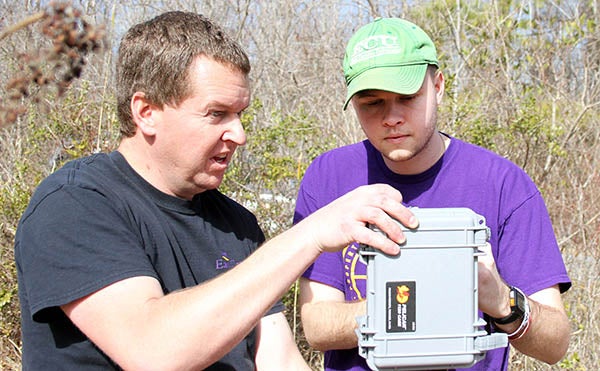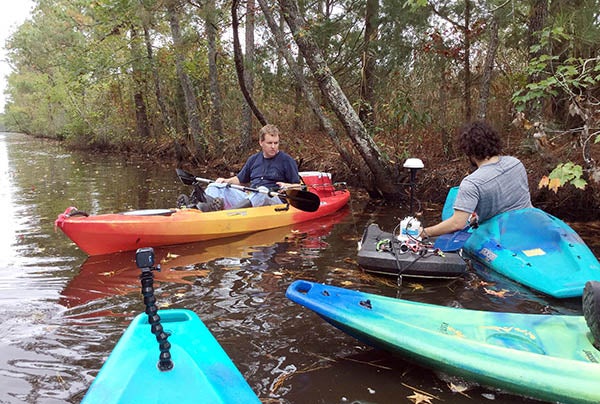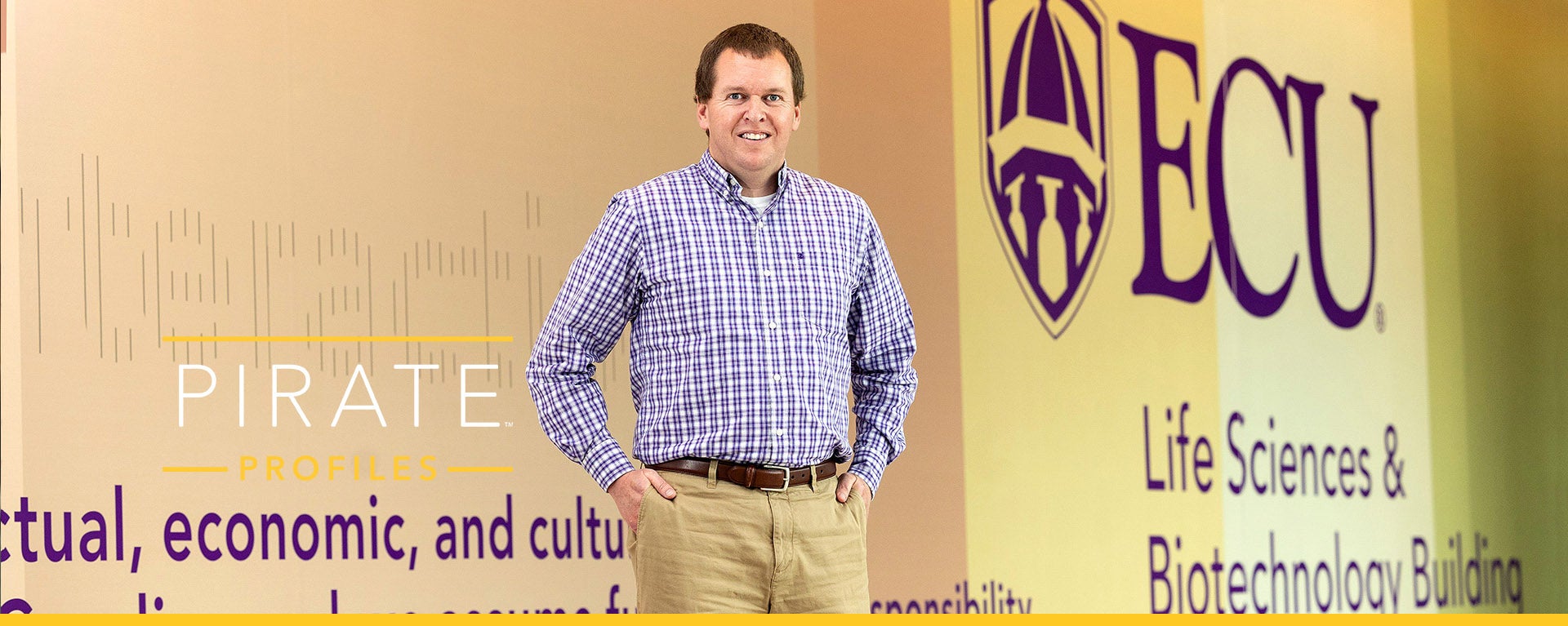Faculty: Randall Etheridge
From the freezing cold of Finland to hot and humid southern marshes, Randall Etheridge has experienced it all. It’s just part of his quest to help provide solutions to environmental problems and to inspire his students to do likewise.
“I enjoy being outside and working outside,” said Etheridge, an associate professor in the Department of Engineering in East Carolina University’s College of Engineering and Technology.
Etheridge teaches senior environmental engineering courses as well as engineering design and project management courses. His research may put him on a kayak in the canals draining Lake Mattamuskeet one day or have him pounding stakes into the ground for the placement of environmental sensors the next.

Randall Etheridge, left, and electrical engineering student Zeke Holloman install new equipment to collect hydrology data at the West Research Campus last year. (ECU photo by Ken Buday)
A native of the Pitt County community of Pactolus, Etheridge said that upbringing helped form his passion for the environment.
“Growing up here in eastern North Carolina during a period of time where regularly on the news you heard about fish kills, and then growing up in an agricultural community and understanding the importance of agriculture for the economy of eastern North Carolina and for our food — I really wanted to work at that intersection,” he said. “How are we going to protect the environment while still producing food and supporting the economy the way we need to?”
Etheridge thought he wanted to design and build boats, but participating in wetland restoration projects as a student researcher in college changed his mind.
“I just fell in love in being out in the environment and doing that type of work,” he said. “We were taking farmland that, due to sea level rise, was no longer productive. We restored the hydrology there so the water stayed on the land a lot more. We planted some vegetation, but for the most part, the seed bank was already there, so the natural vegetation came back. It was just restoring the way the water used to move, the way it used to be.”
In graduate school, he conducted research in Finland — during winter.
“It was a great learning experience, and I got to experience another culture,” Etheridge said. “I actually enjoyed the cold weather. It didn’t bother me, but I was prepared and had the right clothes for it. And I have not worn any of those clothes since I’ve been back.”
Those research experiences put him on a career path to ECU.
“When I graduated, I knew that I enjoyed the research, and I knew that I wanted to help develop solutions that would help people,” Etheridge said. “I started out working for a state agency in Florida implementing engineering solutions. While I was there, I had a desire to get back into academia, and the position here at ECU opened. I had never done a lot of teaching, but when I got here and started teaching, I really enjoyed it.”
Etheridge relishes the emails he receives from students and former students.
“Seeing their successes is what I really enjoy,” he said. “I enjoy getting to know what led them on the path to where they are now, where they want to be, and how I can potentially help them get to where they want to be.”
And like when he was in college, Etheridge sees plenty of value in student research.
“Going in and doing research, students gain skills that will help them in their careers,” he said. “We’ve heard over and over again as faculty members that research makes their resumes stand out. We’ve had students who have applied to work for international consulting firms, and we know those firms are getting piles and piles of resumes, and it’s our students here at ECU who are getting hired because they are getting that research experience.
“So, I think it sets them up well, whether they want to go directly into a career, or it sets them up even better if they want to go to grad school because it will make them more competitive when they’re applying for research assistantships and fellowships.”

Randall Etheridge, left, works with a student as they prepare a device that measures water flow and surveys the bottom of a canal at Lake Mattamuskeet. (Contributed photo)
Etheridge arrived at ECU in 2015, and a year later, Hurricane Matthew hit, flooding many eastern North Carolina communities. That disaster has shaped some of his research, including an interdisciplinary look at flooding around Lake Mattamuskeet in which students and faculty sought input from community members and incorporated those ideas into possible solutions.
“We presented to the community three different concept plans: Here are ways you can potentially address these problems. Here’s how much they’re going to cost. Here’s how effective they’re going to be,” Etheridge said. “Instead of going in and telling them the solution, we gave them the option so they could decide which solution they wanted to pursue.”
Etheridge is also thinking of long-term solutions to flooding problems.
“We’re looking into using things like artificial intelligence to manage water to produce the outcomes we want,” he said. “… We’re looking into how we can develop a network of water control structures throughout eastern North Carolina that will all work together to hold water back at the right time to reduce flooding.”
Among his accolades, Etheridge was named to the American Society of Agricultural and Biological Engineers’ New Faces of 2020. He also received ECU’s Scholarship of Engagement Award last year.
“I was highly honored to receive that award because one of my primary goals for coming to ECU was to help the region,” he said.
Etheridge understands the importance of his research on the environment, but it does provide an additional benefit.
“Seeing the wildlife is one of the fun things,” he said. “I’ve been out at Lake Mattamuskeet in the winter, and all the waterfowl are there and there are thousands of birds flying around. I’ve been out other places where it’s not uncommon to see bear and deer and all types of wildlife.”
After a long day of teaching or research, Etheridge comes home to a family that includes wife Laura and their 4-year-old daughter Charlie Kate.
“It’s a lot of fun,” he said. “You work all day, you’re exhausted, and you go home and it’s time to go outside and push her on the swing or play whatever she wants to play outside or hang out inside. It gives me another boost of energy when I get home.”
FAST FACTS
Name: Randall Etheridge
Titles: Associate professor, Department of Engineering
Hometown: Pactolus, North Carolina
Colleges attended and degrees: N.C. State University, Bachelor of Science in biological engineering with agricultural and environmental concentrations; Master of biological and agricultural engineering; doctorate in biological and agricultural engineering
PIRATE PRIDE
Years working at ECU: Seven
What I do at ECU: Teach senior environmental engineering courses, teach engineering design and project management courses, and do research with the Center for Sustainable Energy and Environmental Engineering.
What I love about ECU: The people! The Department of Engineering is like a family with a focus on doing what is best for our students. My research collaborators are awesome to work with. They want to do high-quality work that will benefit our region.
Research interests: Focused on developing engineering solutions to water resources issues that are being faced by rural communities in eastern North Carolina. I am specifically interested in using nature-based solutions to reduce flooding and improve water quality.
What advice do you give to students? Try to get some career-related experience as early as possible while at ECU. The experience could be an internship, research or a co-op. It will help you learn what you like or don’t like and is valued by employers.
QUICK QUIZ
What do you like to do when not working? Spend time with my wife and daughter, home improvement projects or fishing.
Last thing I watched on TV: “Peaky Blinders”
First job: I spent a lot of time working on my parents’ small farm growing up. My first paid job was mowing grass at Bradford Creek golf course.
Guilty pleasure: All kinds of smoked meat — pork, brisket, ribs, turkey.
Favorite meal: Steak and a salad
One thing most people don’t know about me: I lived in Finland for seven months during the winter while in grad school to do research.
